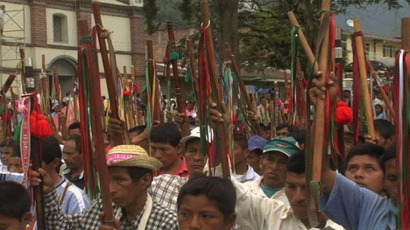By Haley Cullingham
“When they resist against the guerrillas, the government likes them, respects them. But as soon as they ask the government and the society to change a very unequal economic structure, the government attacks them, and considers them subversive.”
In Colombia, a group of indigenous farmers fight against monoculture to regain their land. Margarita Martinez and Miguel Salazar chronicle the fight of the Nasa people, who use peaceful civil resistance to send their message to the government and the guerrilla forces. In a country torn apart by violence, the Nasa symbolize a new way of thinking, but unfortunately, the Colombian government won’t listen to their plea for land, going back on commitments made after a police massacre tore the community apart.
What drew you to the story of the indigenous guard?
Miguel Salazar and I had followed on the news the amazing stories of civil resistance of the Nasa against the guerrillas. I was a reporter at the Associated Press in Bogota and did a story about them and was really impressed with their commitment and organization.
On November 2005 I went to ask for permission from the indigenous authorities and then we went again in December for a formal authorization with all the top heads at the time. That is how we started.
Did you intend for Lucho to be a cornerstone of the film, or did that narrative emerge over the process of shooting?
Lucho was at the time the head of the indigenous guard, so from the beginning we thought that he might be the one who could symbolize their struggles, commitments, and values. But as we shot, he emerged more and more as the cornerstone of the film.
What are your thoughts on the pacifist actions of the Nasa?
We admired the fact that in a country that has lived for more than six decades in an internal conflict, with massacres, displacements, kidnappings, they have chosen a different way to maintain a struggle, to keep fighting for their ideals and needs.
As you saw in the film, the temptations of using violence are always there, they have always corrected and gone back to the ideas of civil resistance.
Do you think the government truly respected these tactics?
I would quote them: when they resist against the guerrillas, the government likes them, respects them. But as soon as they ask the government and the society to change a very unequal economic structure, the government attacks them, and considers them subversive.
Why was the plight of the Nasa so misrepresented in the media?
There are only two main channels on Colombia TV, that belong to two economic groups. 85% of Colombians get their news from their newscast. One of the TV channels, RCN, belongs to an economic group that also has extensive sugarcane production right next to the Nasa territories.
We don´t know if the owner tells the journalists not to interview the natives, but we have seen the journalists that only cover the police and the government side.
What is the consequence for Columbia if these farming practices continue?
There are at least two problems: if you only “grow” biodiesel a country risks its food security. But also, monoculture deeply affects the fertility of the land.
Stolen Land screens Saturday, May 1st @ Innis Town Hall, 9:15 pm, & Monday, May 3rd, at Cumberland 2, at 4:30 pm.



 Follow Us On Instagram
Follow Us On Instagram
